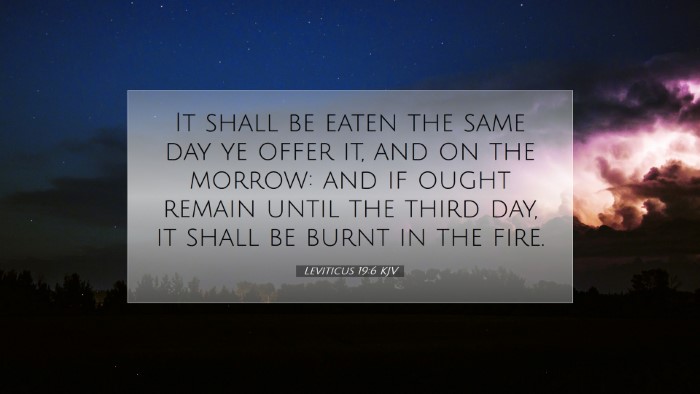Commentary on Leviticus 19:6
Leviticus 19:6 states: “And you shall eat it the same day you offer it, and on the day after; and anything left over until the third day shall be burned with fire.” This verse forms part of a larger discourse on holiness and the proper conduct expected of the Israelites. It highlights the importance of timely offerings and adherence to divine commandments, reflecting the character of God’s covenant with His people.
1. Contextual Background
Leviticus 19 forms a crucial segment within the Holiness Code, emphasizing ethical and ritual purity for Israel. This chapter touches on practical holiness in daily life, encapsulated in the imperative to love one’s neighbor as oneself (Leviticus 19:18).
2. Summary of Key Themes
- Timeliness of Offerings: The verse underlines the urgency and sanctity associated with sacrificial offerings. The command to consume the offering within a specified time reflects the necessity of engaging with the divine through timely obedience.
- Holiness in Community: This command also serves to promote communal integrity and fosters a sense of accountability among the people regarding their offerings.
- Reflection on God’s Character: The stipulations regarding the sacrifice illustrate God’s desire for His people to engage with Him meaningfully, underlining His holiness and the seriousness of their covenant obligations.
3. Exegetical Insights
Matthew Henry notes that the guidelines surrounding sacrificial offerings were essential in establishing a reverent approach to worship. He asserts that God desires sincerity in worship, and every element must reflect that commitment. The significance of consuming the offering promptly emphasizes that the Israelites’ relationship with God is both immediate and binding.
Albert Barnes further emphasizes the cultural and religious context of ancient Israel, highlighting the implications of consuming sacrificial meals within a specific timeframe. This practice served as a memorial of God’s provision and established a communal bond through shared meals, reinforcing unity among the worshippers.
Adam Clarke elucidates the practical application of this command by exploring the spiritual symbolism inherent in sacrificial meals. Clarke maintains that the Israelites were to partake in the joy of God's provision without delay, indicating an active participation in the covenant relationship. He posits that any remnants not consumed by the third day were to be destroyed, reiterating that what is offered to God should be treated with utmost respect and urgency.
4. Theological Implications
This verse speaks profoundly to contemporary audiences regarding the nature of worship and sacrifice. Key theological reflections include:
- Understanding God’s Holiness: The call to consume the sacrifice within a designated timeframe underscores the sacredness of our offerings to God. The promptness reflects a heart that is sensitive to God’s holiness.
- Communal Worship: The sacrificial communal meal strengthens the bonds of fellowship among the people, highlighting the corporate aspect of worship, which is essential within the body of Christ today.
- God’s Provisions Are to be Cherished: The act of consuming what has been offered underscores gratitude for divine provision and invites reflection on how believers today can honor God’s gifts.
5. Applications for Modern Believers
In applying the truths of Leviticus 19:6 today, modern believers can glean valuable lessons about their worship practices and relationships:
- Promptness in Worship: Believers are encouraged to respond swiftly to God’s prompting in worship and service. Delays in our spiritual commitments can signify a lack of reverence or appreciation for God’s gifts.
- Living as a Community of Faith: Recognizing that worship is not just an individual endeavor, Christians are called to build each other up in their shared faith, much like the Israelites were called to share in their sacrificial meals.
- Integrity in Offerings: Every believer is challenged to ensure that their offerings—be they time, resources, or talents—are rendered in accordance with God’s expectations, reflecting both sincerity and respect.
6. Conclusion
Leviticus 19:6 serves as a reminder of the seriousness of our relationship with God and the importance of our corporate identity as His people. The call to timely engagement with the divine through our offerings resonates with the New Testament understanding of living sacrifices and holy worship (Romans 12:1). As we dissect this verse, we find that the ancient command still bears relevance for today’s believers, challenging us to reflect on how we approach worship and our community of faith.


